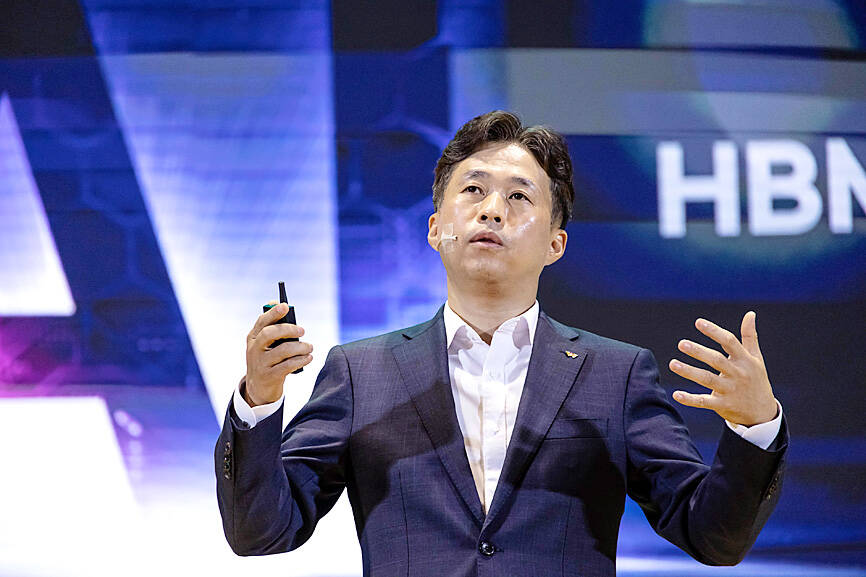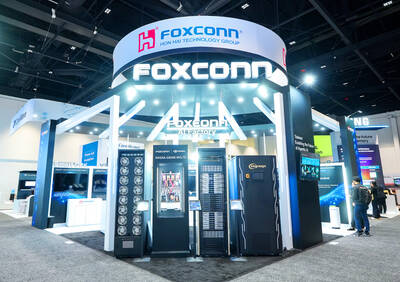The head of artificial intelligence (AI) computing giant Nvidia Corp asked South Korea’s SK Hynix Inc to speed up delivery of newer, more advanced HBM4 chips by six months, SK Group said yesterday.
Nvidia chief executive officer Jensen Huang (黃仁勳) made the request amid a global shortage of crucial advanced chips, which SK Hynix has pledged to work on with fellow market leader Taiwan Semiconductor Manufacturing Co (台積電).
SK Hynix, the world’s second-largest memorychip maker, is racing to meet explosive demand for the high-bandwidth memory (HBM) chips that are used to process vast amounts of data to train AI, including from Nvidia, which dominates the market.

Photo: Bloomberg
“The current pace of HBM memory technology development and product launches is impressive, but AI still requires higher-performance memory,” Huang said by video link at an AI summit in Seoul.
Last month, SK Hynix said that it was on course to deliver the 12-layer HBM4 chips by the second half of next year.
SK Hynix yesterday said that it would ship samples of the first-ever 16-layer HBM3E chips by early next year, as it seeks to bolster its growing AI chip dominance.
“Nvidia is demanding more HBM as it releases better chip versions every year,” SK Group chief executive officer Chey Tae-won said.
It was a “happy challenge” which kept the company busy, he added.
The company said it was mass-producing the world’s first 12-layer HBM3E product in September, and aims to ship samples to clients of the newer, more advanced products quickly.
The additional layers add more bandwidth speed, power efficiency and improve the total capacity of the chips.
“SK Hynix has been preparing for various ‘world first’ products by being the first in the industry to develop and start volume shipping,” SK Hynix CEO Kwak Noh-jung said.
“SK Hynix has been developing 48GB [gigabyte] 16-high HBM3E in a bid to secure technological stability and plans to provide samples to customers early next year,” he added.
In 2013, SK Hynix launched the first HBM chips — cutting-edge semiconductors that enable faster data processing and the more complex tasks of generative AI.
Rival Samsung Electronics Co has been lagging behind SK Hynix when it comes to HBM chips, and the market capitalization gap between Samsung Electronics and SK Hynix reached its narrowest level in 13 years last month.
SK Hynix’s shares yesterday rose 6.48 percent, while Samsung Electronics increased 0.69 percent.

Anna Bhobho, a 31-year-old housewife from rural Zimbabwe, was once a silent observer in her home, excluded from financial and family decisionmaking in the deeply patriarchal society. Today, she is a driver of change in her village, thanks to an electric tricycle she owns. In many parts of rural sub-Saharan Africa, women have long been excluded from mainstream economic activities such as operating public transportation. However, three-wheelers powered by green energy are reversing that trend, offering financial opportunities and a newfound sense of importance. “My husband now looks up to me to take care of a large chunk of expenses,

SECTOR LEADER: TSMC can increase capacity by as much as 20 percent or more in the advanced node part of the foundry market by 2030, an analyst said Taiwan Semiconductor Manufacturing Co (TSMC, 台積電) is expected to lead its peers in the advanced 2-nanometer process technology, despite competition from Samsung Electronics Co and Intel Corp, TrendForce Corp analyst Joanne Chiao (喬安) said. TSMC’s sophisticated products and its large production scale are expected to allow the company to continue dominating the global 2-nanometer process market this year, Chiao said. The world’s largest contract chipmaker is scheduled to begin mass production of chips made on the 2-nanometer process in its Hsinchu fab in the second half of this year. It would also hold a ceremony on Monday next week to

State-run CPC Corp, Taiwan (CPC, 台灣中油) yesterday signed a letter of intent with Alaska Gasline Development Corp (AGDC), expressing an interest to buy liquefied natural gas (LNG) and invest in the latter’s Alaska LNG project, the Ministry of Economic Affairs said in a statement. Under the agreement, CPC is to participate in the project’s upstream gas investment to secure stable energy resources for Taiwan, the ministry said. The Alaska LNG project is jointly promoted by AGDC and major developer Glenfarne Group LLC, as Alaska plans to export up to 20 million tonnes of LNG annually from 2031. It involves constructing an 1,290km

NEXT GENERATION: The company also showcased automated machines, including a nursing robot called Nurabot, which is to enter service at a Taichung hospital this year Hon Hai Precision Industry Co (鴻海精密) expects server revenue to exceed its iPhone revenue within two years, with the possibility of achieving this goal as early as this year, chairman Young Liu (劉揚偉) said on Tuesday at Nvidia Corp’s annual technology conference in San Jose, California. AI would be the primary focus this year for the company, also known as Foxconn Technology Group (富士康科技集團), as rapidly advancing AI applications are driving up demand for AI servers, Liu said. The production and shipment of Nvidia’s GB200 chips and the anticipated launch of GB300 chips in the second half of the year would propel